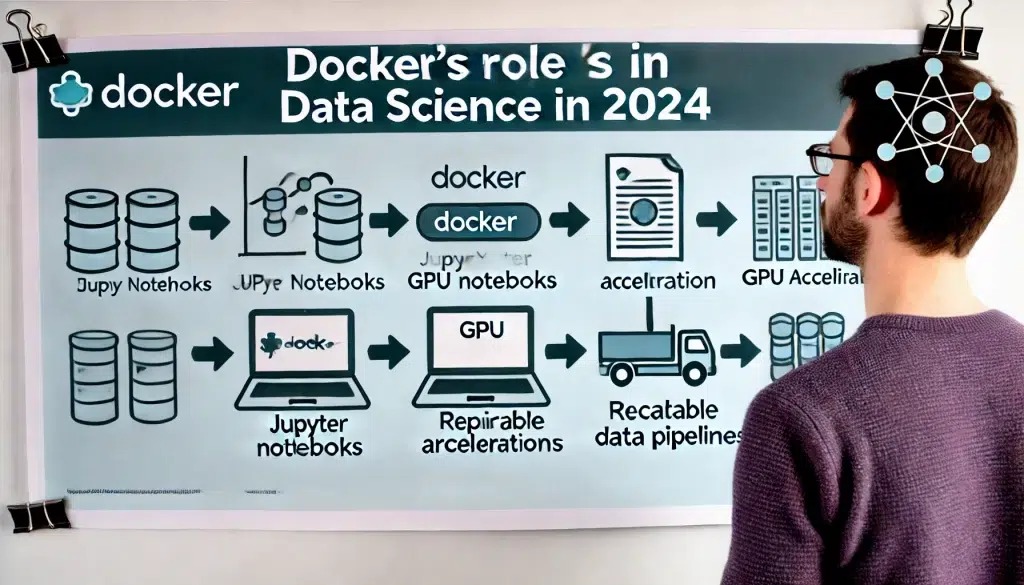Docker for Data Science: Key Trends and Tools to Watch in 2024
In 2024, Docker continues to be a game-changer for data science by providing containerized environments that ensure reproducibility, scalability, and seamless collaboration. As data science projects become more complex, Docker offers the tools needed to package dependencies, streamline workflows, and enable collaboration across teams. This article explores the key trends and tools shaping Docker’s impact on data science in 2024.
Why Docker is Essential for Data Science
Data science projects often involve a variety of dependencies, libraries, and tools that need to work seamlessly across multiple environments. Docker helps by providing a consistent, isolated environment for data scientists, ensuring that code runs the same way across different systems.
Benefits of Using Docker for Data Science:
- Reproducibility: Docker containers package all dependencies, ensuring that models and analyses are reproducible.
- Scalability: Easily scale data science applications across multiple nodes using Docker containers.
- Collaboration: Containers make it easy to share environments with collaborators, reducing setup time.
Key Trends in Docker for Data Science in 2024
1. Pre-Built Data Science Containers
Docker offers pre-built containers for popular data science tools and libraries like Jupyter, TensorFlow, PyTorch, and RStudio. These containers are optimized for performance and ready to use, reducing setup time.
Key Features:
- Jupyter Notebooks: Pre-packaged containers with Jupyter for interactive data analysis.
- AI/ML Frameworks: Ready-to-use containers for TensorFlow, PyTorch, and other ML libraries.
- Data Visualization Tools: Containers with Matplotlib, Seaborn, and Plotly for easy data visualization.
2. Docker for Collaborative Data Science Workflows
Collaboration is essential in data science, and Docker makes it easier by providing consistent environments that can be shared across teams. In 2024, Docker introduces new features that streamline collaborative workflows.
Key Benefits:
- Environment Sharing: Use Docker Hub to share containers with teammates.
- Version Control Integration: Integrate containers with GitHub for seamless versioning.
- Multi-User Jupyter Notebooks: Host shared notebooks inside Docker containers for team collaboration.
3. Docker and GPU Acceleration for Data Science
Many data science tasks, such as model training and simulations, require GPU acceleration. Docker now supports multi-GPU environments, enabling faster computation and better performance for large datasets.
Key Features:
- Multi-GPU Support: Docker containers can leverage multiple GPUs for parallel computation.
- Cloud GPU Integration: Use Docker with AWS, Azure, or Google Cloud GPUs for heavy workloads.
- Monitoring GPU Usage: Monitor GPU utilization inside containers to optimize performance.
4. Scalable Data Pipelines with Docker and Kubernetes
In 2024, more organizations are using Docker with Kubernetes to manage large-scale data pipelines. Docker enables the deployment of containerized ETL processes and ensures that data pipelines run smoothly across clusters.
Key Features:
- Automated Scaling: Use Kubernetes to scale Docker-based data pipelines on demand.
- Data Pipeline Orchestration: Schedule ETL jobs across multiple containers.
- Fault Tolerance: Containers ensure that failed tasks are restarted automatically.
5. Docker for Reproducible Research
Reproducibility is a critical concern in data science, especially in academic research. Docker ensures that code, data, and dependencies are packaged together, making it easy to reproduce results across different systems.
Key Features:
- Containerized Research Environments: Package entire research environments, including datasets and code.
- Archiving with Docker Hub: Store and archive containers for future reference.
- Publication Integration: Share Docker containers alongside research papers for easy reproduction of results.
Table: Key Docker Tools for Data Science
| Tool | Description | Benefit |
|---|---|---|
| Jupyter Notebooks | Interactive notebooks for data analysis | Easy exploration and collaboration |
| TensorFlow | AI/ML framework for model development | Accelerates machine learning tasks |
| Kubernetes | Orchestration tool for managing pipelines | Scalable data workflows |
| Docker Hub | Repository for sharing containers | Simplifies collaboration |
| RStudio | IDE for data science with R | Statistical computing and graphics |
Key Takeaways
- Docker enables reproducible, scalable workflows for data science in 2024.
- Pre-built containers for Jupyter, TensorFlow, and RStudio reduce setup time.
- Docker’s GPU support enhances performance for computationally intensive tasks.
- Kubernetes integration allows data pipelines to scale efficiently across clusters.
- Docker ensures reproducible research, making it easy to share and archive environments.
FAQ
How does Docker benefit data science?
Docker provides consistent, isolated environments, ensuring reproducibility and scalability for data science workflows. It simplifies collaboration and reduces setup time by packaging dependencies.
Can Docker containers leverage GPUs for data science?
Yes, Docker supports GPU acceleration, enabling faster computations for tasks like machine learning model training and data simulations.
How does Docker support collaborative data science workflows?
Docker makes it easy to share environments using Docker Hub and integrates with version control systems like GitHub for seamless collaboration.
What role does Kubernetes play in Docker-based data science pipelines?
Kubernetes automates the deployment and scaling of data pipelines, ensuring that Docker containers can handle large-scale workflows efficiently.
Conclusion
Docker continues to transform data science workflows in 2024 by enabling reproducible research, enhancing collaboration, and supporting GPU-accelerated computation. Whether you’re building machine learning models, running ETL pipelines, or sharing environments with collaborators, Docker provides the tools needed to streamline data science processes. With Kubernetes integration, Docker ensures that your data workflows remain scalable and resilient across different platforms.

